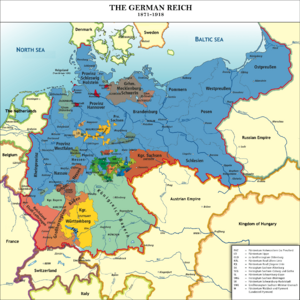Landflucht facts for kids
Landflucht (pronounced "lahnt-flookt") is a German word that means "flight from the land." It describes a time in the late 1800s when many people in Germany (and other parts of Europe) moved from farms and villages to live in big cities. This was a huge change for the country!
Contents
What Does Landflucht Mean?
The word Landflucht was first used by people who owned farms. They were sad because they were losing workers. This is why the word can sound a little negative, as it shows how much they missed their farmhands.
Why Did People Move to Cities?
Before the 1850s, most people in Germany lived in the countryside. About 75 out of every 100 people lived in rural areas. But things started to change quickly!
- Moving West: First, in the 1850s, many people from eastern Germany moved to the western parts. The west had more factories and bigger cities. This was sometimes called Ostflucht ("flight from the east").
- Cities Grow: By the 1870s, the big move to cities, or Landflucht, really began. Cities with lots of factories became popular places to live.
- Big Changes: In 1870, about 64 out of every 100 Germans still lived in the countryside. But by 1907, this number had dropped to only 33 out of 100!
Many people left their homes in areas like East Prussia and Silesia. About 1.6 million people moved to cities by 1900. These former farmers and farm workers found new jobs in factories. In 1800, there were fewer than 100,000 factory workers in Germany. By 1900, there were almost eight million!
One main reason for this big move was money. People could earn more money working in a city factory than they could working on a farm.
How Did This Change Germany?
The Landflucht changed the German countryside and how farms worked.
- New Farming Methods: Farmers started using machines more often to do the work.
- Migrant Workers: They also hired workers from other places, especially Poles from the east. These workers were sometimes called Sachsengänger.
- Land Use Changes: Some farms that needed many workers were turned into other things, like places for hunting animals.
This big move of people also had long-term effects on Germany's borders and population.
See Also
- Demographics of Germany
 | Tommie Smith |
 | Simone Manuel |
 | Shani Davis |
 | Simone Biles |
 | Alice Coachman |


